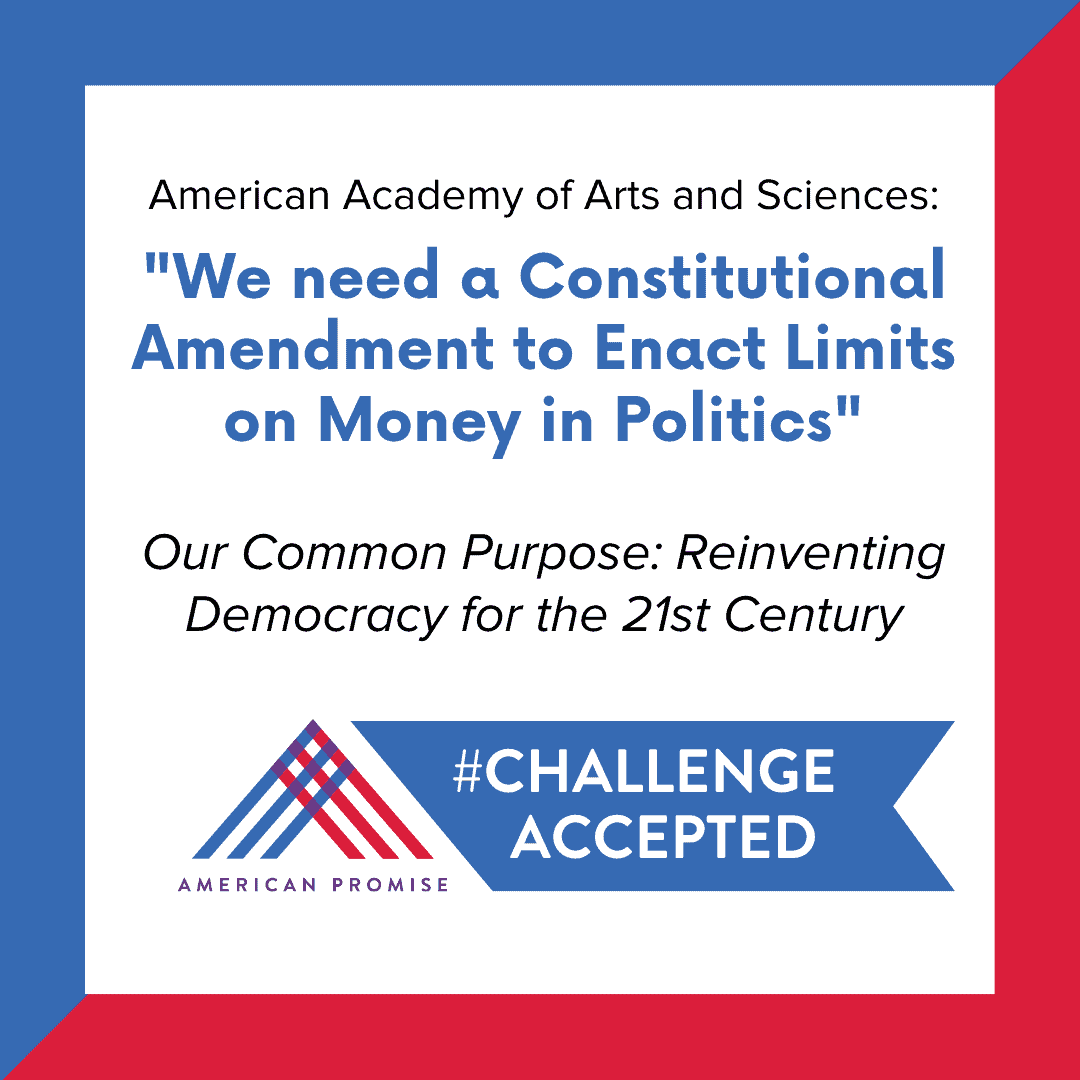“In this age of globalization, centralized power, economic inequality, deep demographic shifts, political polarization, pandemic and climate change, and radical disruption in the media and information environments, we face these converging trends in a Constitutional democracy that feels to many increasingly unresponsive, nonadaptive, and even antiquated.”
With that description of our dysfunctional democracy, the Commission on the Practice of Democratic Citizenship recently challenged Americans to advance its vision for change by working together toward crucial democracy reforms that fall into six broad strategy areas. The strategies were informed by two years of listening sessions with Americans across the country plus study and research by the Commission, which was convened by the American Academy of Arts & Sciences.
Through this challenge, the commission sets out essential steps to strengthen America’s institutions and civic culture in response to widespread recognition that our Constitutional democracy is in crisis. The deadline? Our nation’s 250th birthday: July 4, 2026.
Strategies 1-3 are focused on formal institutions and processes of democracy, which includes the American Promise Amendment to reduce the influence of campaign funding, while strategies 4-6 focus on practicing and developing the habit of democracy, which ties to the mission of American Promise.
Learn more about the challenge: Reinvent democracy for the 21st century
American Promise would like to hear your thoughts on the strategies in the report. Keep reading for an overview of the commission’s vision of a democracy for the 21st century, and share your thoughts in this online poll.
Strategy One: Equality of voice and representation
Elections and the representatives they produce are critical to the health of our democracy. This set of recommendations—addressing redistricting, Congressional districts, and campaign finance reform—outlines how we can meet the Constitution’s promise of equality of voice and representation.
Recommendation highlights (the first should sound familiar to our citizen leaders–American Promise is named as its Champion!):
- Amend the Constitution to authorize the regulation of election contributions and spending to eliminate undue influence of money in our political system, and to protect the rights of all Americans to free speech, political participation, and meaningful representation in government—we say #challengeaccepted!
- Introduce ranked-choice voting in presidential, congressional, and state elections.
- Support adoption, through state legislation, of independent citizen-redistricting commissions in all 50 states.
- Pass strong campaign finance disclosure laws in all 50 states that require full transparency for donations.
Strategy Two: Empowerment of voters
Removing barriers that constrain Americans from exercising their right to vote and promoting voting as a powerful, profound, and joyful expression of political agency are essential actions that must be taken to strengthen the election process.
Recommendation highlights:
- Give people more choices about where and when they vote, with state-level legislation that supports the implementation of voting centers and early voting.
- Change federal Election Day to Veterans Day to honor the service of veterans and their sacrifices in defense of our Constitutional democracy, and to ensure that voting can occur on a day that some people have off from work.
- Establish, through state and federal legislation, same-day voter registration and universal automatic voter registration.
- Restore federal and state voting rights to citizens with felony convictions immediately and automatically upon their release from prison, and ensure that those rights are also restored to those already living in the community.
Strategy Three: Responsiveness of political institutions
Government institutions at the local, state and national levels must become more responsive and adopt technologies that encourage citizen participation, ranging from increasing direct interaction to engaging constituents in decision-making.
Recommendation highlights:
- Adopt formats, processes, and technologies that encourage widespread participation by residents in official public hearings and meetings at local and state levels.
- Design structured and engaging ways for all members of Congress to interact directly and regularly with a random sample of their constituents in an informed and substantive conversation about policy areas under consideration.
- Promote experimentation with citizens’ assemblies to enable the public to interact directly with Congress as an institution.
- Expand participatory opportunities at municipal and state levels for citizens to shape decision-making, budgeting, and other policy-making processes.
Strategy Four: Connectedness in and among communities
Provide opportunities for Americans to assemble, deliberate, and converse with each other to help bridge community divides. Invest in leadership development for the “civic one million” who will be stewards of civic renewal in communities.
Recommendation highlights:
- Establish a national trust to scale up social, civic, and democratic infrastructure. Use funding from a nationwide investment campaign that bridges private enterprise and philanthropic seed funding.
- Invest in new leadership capacity to drive civic renewal in communities across the country by supporting innovations in bridge-building and participatory Constitutional democracy.
Strategy Five: Civic information architecture that supports common purpose
Social media and digital platforms are not inherently bad for democracy. They can be redesigned to support, rather than erode, our Constitutional democracy and sense of common purpose and shared information.
Recommendation highlights:
- Subsidize innovation through state or federal legislation to reinvent the public functions that social media have displaced. A tax on digital advertising could be deployed in a public media fund to support experimental approaches to public social media platforms and local and regional investigative journalism.
- Establish a public-interest mandate requiring for-profit social media platforms to develop designated public-friendly digital spaces.
- Establish and fund a Democratic Engagement Project to serve as a new data source and clearinghouse for research that supports social and civic infrastructure.
Strategy Six: A culture of commitment to American Constitutional democracy and one another
Fostering a culture of commitment to Constitutional democracy and to other Americans can be achieved by supporting civic education, establishing an expanded program of national service, and grappling with the nation’s past to cultivate faith in a democratic future.
Recommendation highlights:
- Establish a year of national service and expand funding for service programs or fellowships that provide young people with paid service opportunities with organizations such as AmeriCorps or the military and in local programs offered by municipal governments, local news outlets, and nonprofit organizations.
- Create a national storytelling initiative to coincide with the 250th anniversary of the Declaration of Independence that engages communities throughout the country in conversations about the complex and evolving American story.
- Launch a philanthropic initiative to support civic gatherings focused on the ethical, moral, and spiritual dimensions of our values as citizens.





